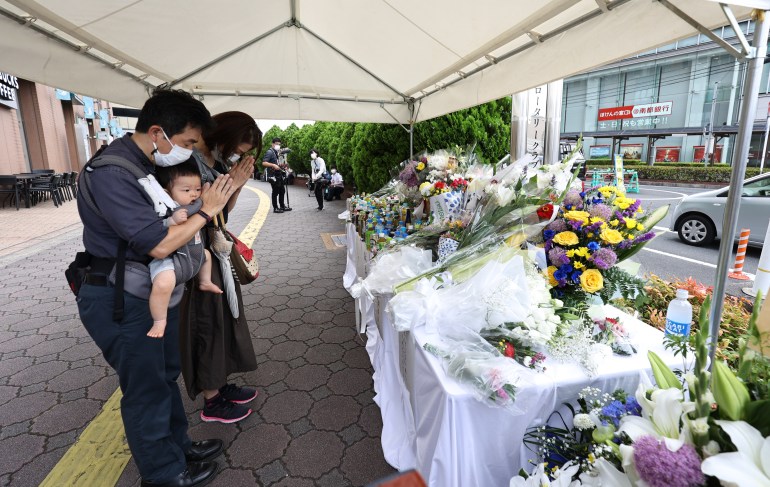Japanese police have admitted that there are gaps in the security of the late Prime Minister Shinzo Abe, who was assassinated during an election rally for the ruling party in the western city of Nara, and whose body arrived at his home in the capital on Saturday, in preparation for his funeral and his funeral next Tuesday.
A procession carrying Abe's body arrived at his home in Tokyo today, and mourners flocked to his home, and Kyodo News Agency reported that Prime Minister Fumio Kishida visited the home of the deceased today to offer condolences.
Mourners carrying flowers flocked, and political officials bowed as the coffin containing the body arrived.
And local media said that an evening vigil would be organized the day after tomorrow, with the funeral taking place on Tuesday in the presence of his close friends.
There have been no reports so far of any public memorial ceremonies.
Japanese lay flowers on tables with pictures of Abe in the city of Nara, where he was killed (European)
Gaps
In Nara, about 450 km southwest of Tokyo, a crowd of people lined up to lay flowers at a table depicting Abe, Japan's longest-serving prime minister in modern times, in a rare incident of political violence while Abe was addressing an election event.
The local police force, which was tasked with securing the electoral event in the city of Nara, said that the security arrangements were flawed.
"I can't deny that there are problems with the security plan given the state of affairs," Nara prefecture police chief Tomoaki Onizuka told a news conference.
"I have a strong sense of responsibility," he added, stressing that the police would analyze what went wrong and implement any necessary changes.
The killer, Tetsuya Yamagami, 41, was arrested immediately after Abe was shot at close range, and police said the suspect had used a homemade firearm and had confessed to shooting Abe, saying the operation was a punishment for him after suspicions of affiliation with an organization.
The police are striving to find out the details and motives for the killing, and local media quoted security sources as saying that the killer, who was arrested by the police immediately after the attack, told her that he believed that Abi was connected to a religious group that he blames for his mother’s severe financial hardship and the disintegration of the family.
The police did not identify the group.
Media reported that the suspect told investigators that he had also visited other places where Abe campaigned, including the city of Okayama, more than 200 km from Nara.
Police said that in the killer's apartment, officers found several rifles that appeared to be similar to those used in the fatal shooting of Abe, and head of the First Investigation Department Kazuhisa Yamamura explained - at a press conference in Nara yesterday - that during the ongoing search for the house, a few weapons were seized. Handmade from a killer's living room.
Abe's killing has raised questions about the security measures the authorities provide to public figures, as politicians usually speak directly to voters outside train stations and supermarkets during election campaigns.
Tomorrow's vote
The political establishment described Abe's killing as an attack on democracy itself, and the prime minister said Japan would not succumb to violence and would continue to organize elections.
The elections in which candidates compete for seats in the upper house (the House of Councilors) in Parliament are proceeding on their scheduled date tomorrow, and Kishida has returned to the course of his electoral campaign.
The prime minister visited regional departments after an emergency return to the capital yesterday in the wake of the shooting, and a metal detector was placed at the site of Kishida's speech in southwest Tokyo, in an unusual security measure in this country, along with an increased police presence.

